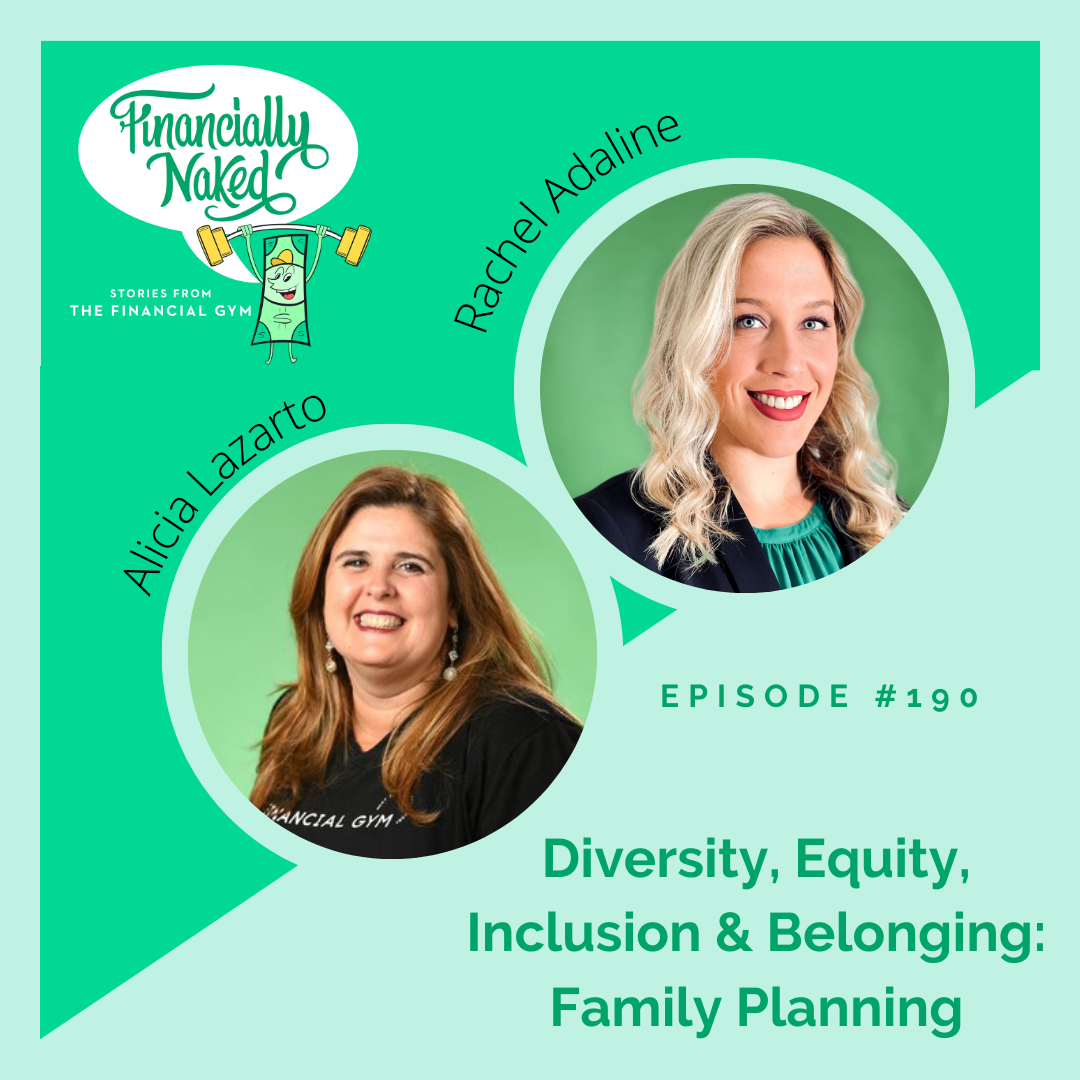Diversity, Equity, Inclusion & Belonging: Family Planning
Welcome back to Financially Naked: Stories from The Financial Gym. This week's episode is another in our Diversity, Equity, Inclusion, and Belonging series. Our host is Rachel Adaline, joined by The Gym's very own Alicia Lazarto. Today's topic shapes countless lives —family planning.
Alicia has navigated the path of raising two college-aged sons while skillfully steering the financial ship in her household. Together, they'll explore insights and tips for finding balance amidst the whirlwind of parenting, focusing on community, financial health, and self-care.
Podcast Notes
There are many ways to start a family, and every journey is different. You will never be able to plan for everything, but there are steps to prepare financially.
Step One in planning by setting goals and timelines for family planning. How many children do you want to have? Which path is your family taking? When do you want to start the process?
How to financially prepare for a new child
Build an Emergency Fund
Emergency funds are a goal for all clients at The Financial Gym, and they become even more important once you have children. If you already have a 3-6 month emergency fund, consider increasing that total even more since your expenses will increase.
If you don't have a fully-funded emergency fund, focus on building that up. No matter how much you plan ahead, unforeseen circumstances will pop up.
Budgeting and Expense Preparation
We know that children can be expensive, but how much we need to save is not always clear. You don't have to have an exact number, but start researching the things you know are necessities. Add those into your budget and savings goals.
You will learn as you go and adjust as needed, so don't stress about being perfect.
Navigating Healthcare and Family Leave
If you live in America, childcare and medical costs are an enormous cost of raising children. If you have benefits through work, like health insurance and paid leave, explore those options early. Speak to the benefits manager at work if the option is available.
Plan for the baby's health insurance. If you have a partner, compare your benefit packages to see who has the better plan.
Try to work with providers in your network and understand what your insurance covers and is not, so you can build it into the budget.
The hospital bills roll in after you're home, which can feel daunting. The bills are itemized and often have mistakes in them. Review the statement and call your insurance provider or the hospital if you have questions.
If you feel like you're unable to pay, call the hospital. They are flexible and sometimes offer payment plans and programs to help with bills.
Planning for childcare and support:
It truly takes a village to raise a child. Finding help will be extremely important, especially for working parents. No matter how prepared you are, you will need help.
Before the baby comes home, have a plan for who will help you out. Surround yourself with people who can support you.
Managing Childcare and Work
It can be challenging to balance work responsibilities with caring for a child. This is the reality for a lot of parents.
Communicate with your employer to see what benefits or accommodations are available. Some offices have daycare at work or allow you to work from home, so you can have a more flexible schedule.
Daycare is expensive. If you put your child in daycare, research the options and find what works best for your family and budget.
You may find that daycare is not the best option for you, and that's okay. Explore the other options and tap your network.
Prioritizing Self-Care
Self-care is essential for parents. Taking care of yourself allows you to take care of the family. If you have friends and family who want to help, let them.
No guide comes with becoming a parent, and there will be challenges and uncertainties. The rest will work out if you care for yourself, your child, and your relationships.
Planning for the future
529 plans can be a fantastic way to save for your child.
The rules have changed over the last few years, making the funds more flexible and accessible for your family.
You'll want to start planning early because life goes fast, and things are getting increasingly expensive for kids each year. It can feel daunting, but plenty of options are available to help with paying for college. There are grants and scholarships out there for students.
Estate Planning and Final Reminders
Estate planning is important for everyone, but even more so once you have children. If they are under 18, your will has a plan for what you want to happen to your kids if something ever happens to you.
Start money conversations with your children early! There are many age-appropriate ways to teach kids about money, all of which will help set them up for long-term financial health.
If you want to work with a Certified Financial Trainer to help navigate family planning, schedule a free warm-up call today! If you have any ideas or questions for the show, send an email to trainerpodcast@fingyms.com.
Resources
Meet The Team
Meet Rachel Adaline, Human Resources Manager
Meet Alicia Lazarto, Chief Operations Officer

